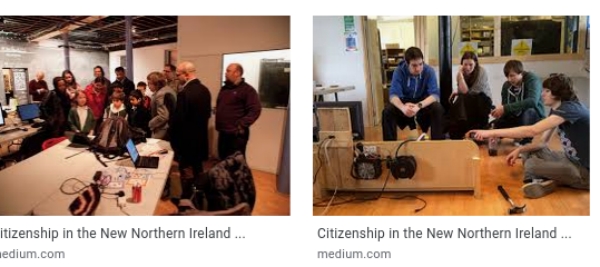Manipulated fablabs in Ireland
Sometimes, above fablabs and makerspaces there is much more than a bunch of hackers.

A paper published two years ago describes “Makerspaces and urban ideology: the institutional shaping of Fab Labs in China and Northern Ireland”.
Re-reading it today, I decided to publish this summary, because it adds to the fablab and makerspace picture levels, and sides, that most people do not even imagine exist:
“FabLabs in Belfast and Derry (Northern Ireland) are deployed as facilitators and enablers of unification processes in a post-conflict society, while Fab Labs in Shenzhen (China) have been manipulated for a specific post-industrial agenda”.
The study describes how both its case studies are shaped by public institutions more than by global maker culture rhetoric. In both cases, makerspaces become “symbols of contested meanings and values in specific geo-political contexts”.
Those fablabs (but they are surely not the only cases in the world!) unlike makerspaces situated in market-driven economies, are linked to policies that prioritise specific urban ideologies and local aspirations rather than the DIY, bottom-up paradigm.
In this post, I summarize the “Northern Ireland” case study that led to these conclusions (the Shenzhen case study is described in another post).
Northern Ireland
Post-conflict Northern Ireland is in need of a new relationship with urban environments that is capable of attracting new industries and investments.
Maker culture and makerspaces in Northern Ireland are thoroughly entangled with social, economic, and political issues arising from the so-called “Troubles”.
Although violence has subsided, reconciliation is ongoing, and Northern Ireland’s makerspaces are actors in this peace process. The concepts of “shared spaces” in Northern Ireland has a meaning that is inextricably linked with historical societal separation due to sectarianism.
A shared space denotes a place that actively encourages and supports the co-existence of both Catholic and Protestant communities. So, a shared machine shop - or makerspace - by virtue of its status as a shared space, is embedded with the symbol of post-conflict reconciliation [and consequently plays] an important role in the civic reconciliation project.
Makerspaces in Northern Ireland have… also been viewed through the lens of “agonism', as a way of explaining how the oppositional forces of sectarian politics of Northern Ireland can become productive.
The framing of Fab Labs NI as a peace-building intervention means its production capacities are limited.
Makerspaces in Northern Ireland are charged with creating hope and opportunities for those affected by tensions on the ground… so they may contribute to the “new Northern Ireland” imaginary.
(continues here)
Image source: DIY Citizenship in the New Northern Ireland: The Case of a Belfast Makerspace
(This post was drafted in May 2020, but only put online in August, because… my coronavirus reports, of course)
Who writes this, why, and how to help
I am Marco Fioretti, tech writer and aspiring polymath doing human-digital research and popularization.
I do it because YOUR civil rights and the quality of YOUR life depend every year more on how software is used AROUND you.
To this end, I have already shared more than a million words on this blog, without any paywall or user tracking, and am sharing the next million through a newsletter, also without any paywall.
The more direct support I get, the more I can continue to inform for free parents, teachers, decision makers, and everybody else who should know more stuff like this. You can support me with paid subscriptions to my newsletter, donations via PayPal (mfioretti@nexaima.net) or LiberaPay, or in any of the other ways listed here.THANKS for your support!